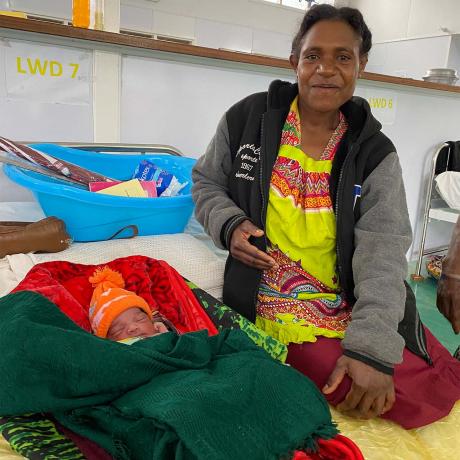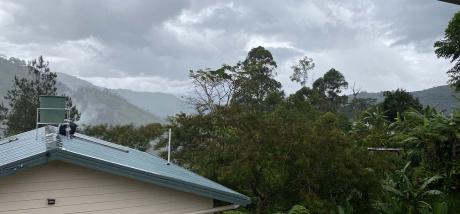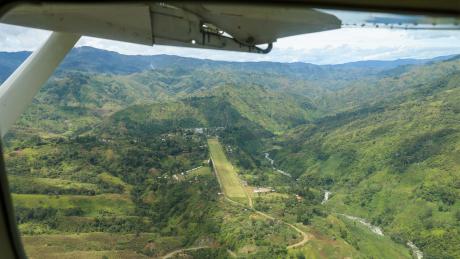
Starting the day with prayer
The Monday morning sun shines brightly when I leave my house. The air is still fresh from the rains that fell overnight, and my feet are wet by the time I reach the hospital. During the wet season, the ground really does not get enough time to dry in between the afternoon rains. We start our day with singing songs and giving praise to the God who made us all, who made this earth, and who is giving us strength each day to do our job. The pastor is sharing a verse from Matthew 7: Ask and it will be given to you, seek and you will find, knock and it will be opened. We are reminded to keep asking and keep praying. Our God hears and will give us what we need.
Refreshed from the worship, I stroll down to the ward. Pondering these words and shamefully realizing that I do not pray persistently. I am quick to give up, concluding that God must have other plans. I thank God for his word today and for giving me nudges along the way of how to pray.
Morning ward round - The new asthmatic patient
When I arrive on the ward, most staff are already there. We do a few “tok saves”, which are general announcements, and start off the ward round.
A new patient came in overnight. She is elderly and known for having asthma and trouble breathing. Initial results show that she likely has pneumonia, which is making her asthma worse. Overnight she was given oxygen, antibiotics, and puffers and she already seems much better than when she came in. She looks very thin and there are no breath sounds on the left side of her chest, so we decide to do a chest x-ray to make sure nothing else is going on and move on with the round.
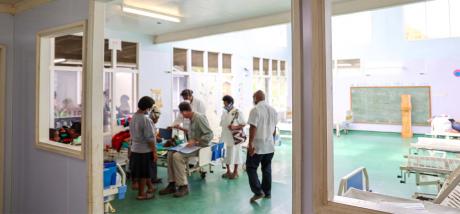
Challenges when treating TB patients
We see Felix*, who has been unable to properly move both his legs for about a year, likely from nerve damage from a combination of HIV and Tuberculosis (TB) of his spine. He has been started on HIV and TB treatment and we are encouraged to see that his strength is actually slowly improving.
Then there is Jenny*, she also has TB, around her heart, but the TB medication is giving her terrible stomach pains and she does not want to take them. We have a long talk with her that she will die if she is not taking the medications. She decides to give it another go whilst we will try to source the individual four components of the TB tablets. Then we could maybe find out which one is making her so sick. This will be a difficult task as very limited supply is available.
Limitations faced
Slowly we see everyone and for some there is little we can do. End-stage liver disease due to chronic Hepatitis is common and people suffer terribly from the liters of fluid they carry within their abdomen. Then there are the cancers, generally, people put up with minor symptoms or simply do not have a way to be checked and then turn up only when there is little treatment possible. So, all we can offer is comfort care. Referring is not an option. Port Moresby is hardly coping with their own district and people from the country are rarely given priority.
At the paediatric ward
Paediatric ward is fairly quiet. A smiling young boy greets us. He was brought in two weeks ago; his father had carried him two long days through the jungle to reach the hospital. He was unwell and unable to walk due to osteomyelitis of his left leg. This has been drained and since then he has received antibiotics which he will have to continue for six weeks. Now he is able to walk again, and he is keen to go home. However, there is no aid post or a facility close enough to his home to continue dressing his wound, so he will have to stay until his wound is dry, which will probably take at least another two weeks.
Lunch break and long waiting lines
When I leave the hospital to have some lunch, plenty of patients are already waiting outside the doctor’s clinic room. There is little concept here of time or appointments. You turn up when you arrive and wait until you are seen. It’s as simple as that. I walk back to see the nurse that translates for me this afternoon. We will start clinic a little earlier so that everyone can be seen.
At the antenatal ward
Clinic starts off with a number of pregnant women. It is very encouraging to see new life develop inside a woman’s belly, and it makes me feel that there is hope. However, for the women in PNG it is sometimes associated with a lot of angst and sadness. There are still many women dying in childbirth, which could have been prevented by supervised delivery in a hospital. And almost all women have had one or more babies die. Often within the first month or year after birth. Having a baby is not the joyful experience it should be, it is approached with reservation and sometimes almost detachment due to the many traumatic experiences.
As I scan this new life and meet the mother’s eyes with a smile, I can tell most women that their pregnancy is progressing well and that once the time of birth comes near, they are invited to stay at our hospital waiting house until the baby is ready to come. This way we can give them both the best chance of life.
A potential medevac - a pregnant woman fighting to life
It is almost 4.30pm when I walk home after a busy clinic. The clouds are starting to roll in, and thunder is rumbling in the distance, announcing the coming rains.
Before I am home, I get stopped by Peter, our MAF agent. He asks me whether I am aware of a woman at Mengau, who is pregnant and bleeding and needs to come to hospital. Mengau is one of our outstations. It is very remote. It just has a radio and no clinic, nurse or aid post. Nobody is able to give us more details about her.
Clouds, prayers and pilots
I take a glance at the sky and wonder how they will be able to get here. Ironically, a Health Patrol team was intending to visit Mengau this week, but this visit was cancelled due to the poor quality of the airstrip. I wonder even more whether it is possible to even get her.
Our MAF ladies' prayer team is already onto it and has started praying.
The MAF pilots are very experienced, but sometimes it is simply not safe to fly or land. About half an hour later MAF com calls for a weather update. The visibility has decreased even more, and I can only see a little opening in the clouds in easterly direction. The usual route from the north seems completely covered in cloud.
But then I hear the familiar sound of an airplane. Thank you, God, for hearing our prayer and giving the pilot skill to find the little gaps in the clouds and bring the patient safely here.
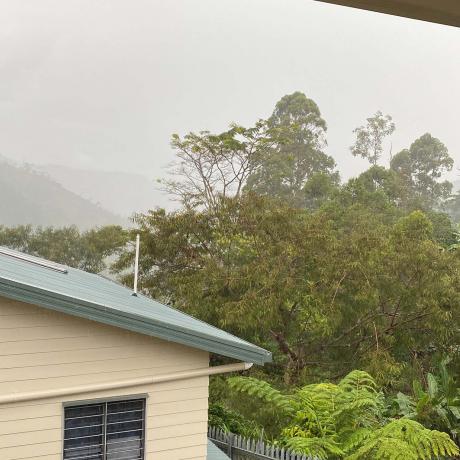
The medevac plane lands
The plane lands safely and we quickly offload the woman into our ambulance. We keep praying as we see the plane trying to take off on the wet airstrip and feel a sense of relief when the plane is airborne. It is leaving again to try to find a way out of the valley so the pilot and some engineers onboard can get back home to their families on this Valentine’s day.
Pamela’s story
Pamela* is attended to quickly. She is a newly married woman. This is her first pregnancy, and during the first few months, everything seemed to be going well. However, she started bleeding a few days ago, which became heavier and heavier, and she was worried she was going to die unless she could get help. When we check her, she had suffered a miscarriage and had indeed lost a fair bit of blood, but fortunately, she is stable. We scan her and tell her that she has definitely lost this pregnancy and then give her some medicine to help her body clear out the rest. This may be all she needs, but we keep a good eye on her during following few days. We tell her that miscarriages happen to a lot of women and that this is not her fault or a result of witchcraft. She should be able to fall pregnant in the future without any problems. We tell about our waiting house, where she is welcome to stay if a subsequent pregnancy progresses, so she can birth in our hospital instead of unsupervised in her village. A smile appears on her face as she feels safe and informed.
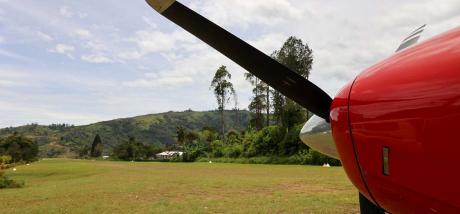
The neverending need for medical care
I wander past the ward before going home again. A little boy with a painful and swollen elbow has just come in. He had a fall and is in a lot of pain. We give him some pain relief and take him around for x-ray. The elbow is obviously broken, but fortunately all his nerves and blood vessels are still working. We decide this can wait until the following day and ask the parents to not give him breakfast, so we can straighten his elbow under anaesthesia.
Thank you, God!
Then I make my third attempt to go home. This time I make it there successfully. After dinner, there is a message on my phone that the pilot and his crew made it safely back to Mount Hagen. I thank God for answering our prayers. Then I get my books out. I better start reading up on how to reduce elbow fractures.
* Except for Pamela, other names have been changed for privacy reasons
